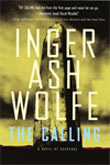|
|
Lady in the Dark Reviewed by Linda L. Richards
For this reader, a single thing marred the sharp perfection of the plotting and prose of The Calling. That was the secret identity of the literary superhero who penned the book. Since publication -- heck, since prepublication -- it has been understood that The Calling was written under a pseudonym by “a well-known North American writer.” Since the book was announced in 2007, a lot of ink has been spilled over guesses as to the identity of this writer. To be honest, having now read The Calling, I feel as though I have a fairly good idea who the writer is. In my opinion, there are few authors with the talent and experience to create characters this vivid and then place them in a plot this engrossing and intense. And, by the way, if you’re hanging in to hear my guess, give it up: I’m not going there. I suppose that, at least for now, part of the experience of reading The Calling is this mystery within a mystery. Who wrote the book? Time will tell. In the meantime, let me say that The Calling is extraordinary. This sounds like hyperbole, but I will risk it: I have never read a book peopled by characters this vivid and with voices this strong. And by voices, I mean voices. The voice of the crime-solving protagonist in The Calling, Detective Inspector Hazel Micallef, is never fully described. Yet I heard it throughout the book: flint on gravel, with evidence of her 61 hard years and the twinned heartbreak and optimism she has endured/continues to endure. Micallef is DI of Port Dundas, Ontario, the land that her police superiors in Toronto and beyond have forgotten, or tried to forget. She is critically understaffed, even before she discovers a serial killer on a cross-Canada rampage may have done some of his dastardly deeds in her small, idyllic town. The murder DI Micallef is called upon to investigate -- the first murder her town has endured in three years -- is that of Delia Chandler, an elderly woman, riddled with cancer before her death, who had an affair with Micallef’s father years before. Delia Chandler’s murder is awful. Beyond anyone’s experience and quite beyond hope. When a man is killed in Chamberlain, 315 kilometers to the east, a few days later, and the murders seem related, Micallef and her team are called in. No one is prepared for what they find at the crime scene. No one could be. And afterwards:
DI Micallef does inhale. Of course she does. But all that illicit nicotine does nothing to bring either peace or clarity and, the closer they look, the problem they suspect grows into something ever more horrifying and impossible. What they come to realize is that while a series of clearly linked murders such as those they’ve uncovered would have been sniffed out in a heartbeat in Toronto or Vancouver, in the rural towns in which they are discovered, there is little to invite comparison or connection. When careful sleuthing does release a connection, it is almost too astonishing to be believed. As a result, the funds and manpower-giving mucky-mucks in Toronto don’t believe what’s before their eyes and Micallef and company are left to soldier on alone, trying to end the killer’s rampage before he stops of his own accord and goes to ground. The Calling is exquisite. It resonates with the rhythms and pleasurable tropes of classic creators of contemporary British crime fiction. And, yes: this story is classically Canadian -- and I suspect the author is, as well -- but if we were to slot The Calling into a single school or force it onto a single bookstore shelf, it would sit near the very best works by Minette Walters, Ian Rankin, Ruth Rendell and P.D. James. DI Hazel Micallef is an exquisite creation in her own right. She’s burdened with a bad back, a failed marriage and a mother whose Friday rye-and-poker nights mean she has a more full social life than does her daughter. Micallef is an alcoholic (note the lack of the word “recovering” there) whose passion and compassion, for us, outweigh the negatives in her personality. Does she cowboy a little bit? Does she stick her neck beyond the place where proper Canadian necks should normally be stuck? She does. Certainly, she does. Yet we understand the grace within her recklessness. And we can’t help but love her for it. And wait. Future crime fiction installments from “Inger Ash Wolfe” are promised. | August 2008
Linda L. Richards is the editor of January Magazine and the author of several novels.
|

